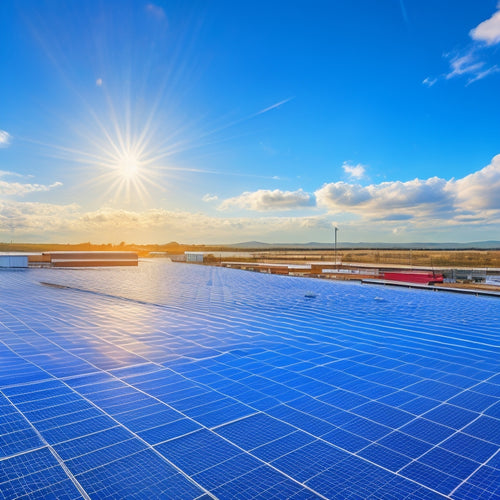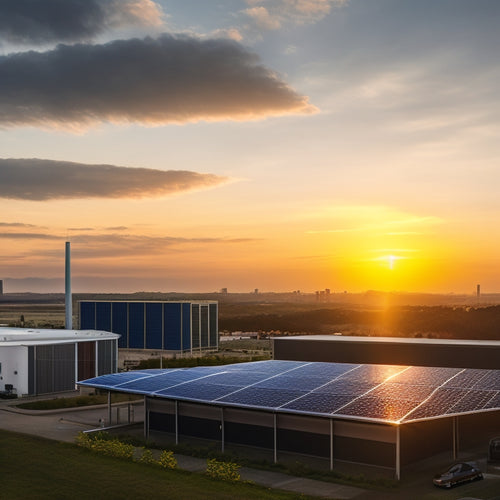
Solar Panels For
Share
You're considering solar panels for your home or business, and you're likely wondering what benefits they can bring. First, solar panels guarantee a zero-carbon footprint, reducing your reliance on fossil fuels and environmental impact. They also increase your property value, with homes selling for up to 17% more. Efficient energy conversion rates and higher power output rates assure you maximize your energy independence. When installing, consider your roof's size, angle, and obstructions to optimize energy generation. As you investigate the world of solar panels, you'll uncover more advantages, from energy-efficient upgrades to government incentives and long-term savings - and that's just the beginning.
The Essentials
- Solar panels significantly reduce reliance on fossil fuels, leading to a drastic reduction in carbon emissions and a cleaner environment.
- Installing solar panels can lower monthly energy expenses and increase property value, with homes selling for up to 17% more.
- High-efficiency solar panels maximize energy conversion, with ideal energy conversion rates around 22% or higher, ensuring peak energy harvesting.
- Solar panels require consideration of roof size, angle, and obstructions, as well as optimal tilt angles to enhance energy generation capability.
- Advancements in solar technology lead to higher energy density output, maximizing power per unit area and enabling efficient energy storage solutions.
Zero Carbon Footprint Guaranteed
When you opt for solar panels, you're not only reducing your energy bills but also contributing to a cleaner environment.
By utilizing clean energy sources, you'll greatly minimize your reliance on fossil fuels, resulting in a drastic reduction in carbon emissions.
With renewable power solutions, you can secure a sustainable future for your home or business.
As a result, you can rest assured that your solar panels will provide a zero-carbon footprint, assuring a sustainable future for generations to come.
Reducing Energy Bills
How much of your hard-earned money is being spent on energy bills every month? You're not alone in wondering how to reduce this financial burden.
Installing solar panels can be the answer to your energy bill woes. While the initial installation costs may seem intimidating, the long-term savings far outweigh them. With minimal maintenance requirements, you can enjoy reduced energy bills for years to come.
By pairing solar panels with a home solar power battery, you can capture and store excess energy generated during the day, enabling you to power your home at night or during power outages without incurring additional costs.
Government incentives and financing options can help offset the upfront costs, making solar panels a more accessible option. Plus, you'll be contributing to a cleaner environment, reducing your carbon footprint and reliance on the grid.
With a reliable system and the latest technological advancements, you can trust that your energy needs will be met. What's more, with grid connection, you can even sell excess energy back to the grid and reap the benefits.
Clean Energy Sources
As you employ the power of solar panels to reduce your energy bills, you're not only saving money, but also contributing to a cleaner environment. By utilizing renewable energy from the sun, you're reducing your reliance on fossil fuels and decreasing your carbon footprint. This not only benefits the environment but also supports your freedom from dependence on non-renewable energy sources.
| Clean Energy Source | Benefits | Government Incentives |
|---|---|---|
| Solar Energy | Zero Emissions, Reduced Energy Bills | Solar Investment Tax Credit (ITC) |
| Wind Energy | Renewable, Sustainable | Production Tax Credit (PTC) |
| Hydro Energy | Low Operating Costs, Reliable | Renewable Energy Production Incentive (REPI) |
In addition to the environmental benefits, governments worldwide are implementing renewable policies and offering solar incentives to encourage the adoption of clean energy sources. These incentives can greatly reduce the cost of installing solar panels, making them a more accessible and affordable option for individuals and businesses alike. By investing in clean energy sources, you're not only contributing to a sustainable future but also taking advantage of the financial benefits that come with it.
Increased Property Value Boost
By installing solar panels, you can increase your property's value and reap the benefits when selling.
In fact, studies have shown that properties with solar panels tend to have higher selling prices compared to those without.
Furthermore, with the rise of eco-friendly homes, solar panels have become a sought-after feature in residential properties.
Additionally, the energy efficiency upgrades that come with solar panels can further enhance your property's value, making it more attractive to potential buyers.
Higher Selling Prices
What makes a property more attractive to potential buyers? You'll be surprised to find that installing solar panels can greatly increase your property's selling price.
With the rising market demand for eco-friendly homes, solar panels have become a highly sought-after feature. According to recent studies, properties with solar panels sell for up to 17% more than those without.
This increased selling price can be attributed to the solar incentives offered by the government, which can considerably reduce the cost of installing solar panels. Additionally, solar panels provide a sense of freedom and independence from the grid, making them a highly desirable feature for environmentally conscious buyers.
As a homeowner, you can capitalize on this trend by installing solar panels and reaping the benefits of a higher selling price. With the increasing demand for sustainable living, it's no wonder that properties with solar panels are selling like hotcakes.
Energy Efficiency Upgrades
Installing energy-efficient features beyond solar panels can further enhance your property's value. By combining solar panels with other energy-saving upgrades, you can maximize your energy independence and elevate your property's appeal to potential buyers.
Here is a breakdown of the benefits:
| Upgrade | Benefits | Cost Savings |
|---|---|---|
| Energy-efficient windows | Reduces heat loss, minimizes energy consumption | 10-20% on energy bills |
| Smart home insulation | Regulates interior temperature, reduces energy waste | 15-30% on energy bills |
| Energy-efficient appliances | Lowers energy consumption, reduces environmental impact | 5-15% on energy bills |
Efficient Energy Conversion Rate
You'll want to focus on solar panels with high-efficiency cell technology to maximize your energy conversion rate.
This technology enables panels to convert a higher percentage of sunlight into electricity, resulting in more power output per unit area.
When it comes to renewable energy, high-efficiency solar panels are essential for reducing your carbon footprint and lowering electricity bills.
A max power output rate of around 22% or higher is considered ideal for efficient energy conversion.
High-Efficiency Cell Technology
Utilizing maximum energy from the sun relies on high-efficiency cell technology, which boasts an impressive energy conversion rate. When you opt for high-efficiency solar panels, you're fundamentally utilizing more power from the same amount of sunlight. This is made possible by advancements in cell performance, which have led to significant efficiency improvements.
These gains are attributed to refinements in manufacturing processes, responding to market trends that prioritize environmentally friendly solutions.
As you examine high-efficiency cell technology, you'll notice enhanced installation techniques that guarantee peak energy harvesting. Additionally, consumer awareness about the environmental impact of traditional energy sources has driven the demand for eco-friendly alternatives.
When selecting a high-efficiency solar panel system, be certain to evaluate warranty options and maintenance requirements to ascertain your investment yields long-term benefits. By doing so, you'll not only reduce your carbon footprint but also enjoy the financial freedom that comes with renewable energy.
Max Power Output Rate
High-efficiency solar panels' impressive energy conversion rates are largely attributed to their Max Power Output Rate, which measures the panel's ability to convert sunlight into usable electricity.
This performance metric is vital in determining the overall efficiency of your solar panel system. You want to maximize your power output to get the most out of your investment, and a high Max Power Output Rate guarantees you're generating the most electricity possible.
When evaluating solar panels, you'll often come across specifications like peak power output, which is usually measured in watts (W).
This indicates the maximum power output your panel can produce under ideal conditions. However, it's important to take into account other performance metrics, such as temperature coefficient and irradiance, to get a thorough understanding of your panel's capabilities.
Consider Roof Size and Angle
When evaluating your roof's suitability for solar panels, you'll need to contemplate the available space and its angle.
You'll want to verify you have enough roof space to accommodate the required number of panels, considering obstacles like skylights, vents, and chimneys.
For instance, a renewable energy solution like solar panels can be a great option for off-grid homes.
Additionally, the size and angle of your roof will also impact the energy efficiency of your solar power system.
You'll need to determine the ideal tilt angle for your panels, as this can greatly affect their energy output.
Roof Space Availability
Before installing solar panels, it's vital to evaluate your roof's space availability, as it directly impacts the number of panels you can fit and, subsequently, the amount of energy you can generate.
You'll need to take into account your roof's size, shape, and obstructions to determine how many panels can be safely installed.
Roof material compatibility is also significant, as some materials may not be suitable for solar panels. For instance, asphalt shingles, metal, and clay tiles are compatible, but slate tiles may not be.
Additionally, you'll need to perform a shading analysis to identify areas of your roof that receive partial or full shade, which can reduce energy production. Shading from trees, chimneys, or neighboring buildings can all impact your solar panel's performance.
Optimal Tilt Angles
Your roof's size and angle play an essential role in determining the ideal tilt angle for your solar panels. The tilt angle affects the amount of energy your solar panels can generate, and getting it right is vital for maximizing your energy output.
| Roof Angle | Ideal Tilt Angle | Seasonal Adjustments |
|---|---|---|
| Flat (0-10°) | 30-40° | ±10° for summer/winter |
| Medium (10-30°) | 20-30° | ±5° for summer/winter |
| Steep (30-60°) | 10-20° | ±5° for summer/winter |
When following installation guidelines, consider the roof's angle and adjust the tilt angle accordingly. For instance, a flat roof may require a steeper tilt angle to guarantee optimal energy generation. Additionally, making seasonal adjustments to the tilt angle can further enhance energy output. By taking these factors into account, you can guarantee your solar panels operate at their best, providing you with the freedom to generate clean energy and reduce your reliance on the grid.
Higher Energy Density Output
You're looking to maximize your solar panel's energy output, and that's where higher energy density output comes in.
By increasing the energy density, you can generate more power per unit area, making the most of your available roof space.
Enhanced power generation is achievable through advancements in photovoltaic cell technology and panel design.
Enhanced Power Generation
Inside the domain of solar panel technology, a critical aspect of enhanced power generation lies in achieving higher energy density output. As you investigate the world of solar technology, you'll find that renewable innovations are revolutionizing the way energy is captured and applied. By increasing energy density, you can maximize the power generated per unit area, making solar panels more efficient and effective.
To achieve this, you'll need to evaluate energy storage and grid integration. By storing excess energy generated during the day, you can use it to power your home or business at night or during periods of low sunlight. Grid integration allows you to feed excess energy back into the grid, earning you solar incentives and credits.
Government policies and regulations are in place to encourage the adoption of solar energy, offering benefits like tax credits and rebates. As you weigh the benefits of solar panels, don't forget to assess the environmental benefits, such as reducing your carbon footprint and reliance on fossil fuels.
While installation challenges and maintenance costs are a reality, advancements in solar technology are making it more accessible and affordable. With performance monitoring, you can track your energy output and optimize your system for maximum efficiency.
Frequently Asked Questions
Do Solar Panels Work During Power Outages?
During power outages, you'll stay lit if you've got solar panels paired with solar battery storage, granting you grid independence; this combo allows you to capture and store excess energy, ensuring continuous power supply when the grid goes dark.
Can I Install Solar Panels Myself?
You can attempt a DIY installation, but consider the potential risks and cost considerations; improper installation may void warranties, compromise efficiency, or even lead to safety hazards, so weigh the benefits against the potential drawbacks before deciding.
How Long Do Solar Panels Last?
You'll find that solar panels typically last between 25 to 30 years, with a solar panel lifespan that slowly degrades over time, losing around 0.5% to 1% efficiency per year due to solar panel degradation, but still producing clean energy for decades.
Do Solar Panels Require Regular Maintenance?
You'll need to perform regular checks and maintenance on your solar panels to verify peak performance; this includes solar panel cleaning to remove debris and inverter maintenance to secure efficient energy conversion.
Can I Use Solar Panels With a Septic System?
As you capture the sun's golden rays, you'll find septic system integration is a breeze; solar energy benefits abound, and with a little planning, you'll be sipping sweet freedom, untethered from the grid, with your septic system humming in harmony.
Final Thoughts
You'll be thrilled to know that solar panels for your home are a total revolution! With a zero carbon footprint guaranteed, you'll be saving the planet while enhancing your property value by a whopping amount. And let's not forget the efficient energy conversion rate, which means more power for you. Just remember to take into account your roof's size and angle for maximum output. The result? A staggering increase in energy density output that'll leave you feeling like you're tapping into the sun itself!
Related Posts
-

Top Camping Water Bottles for Adventure
When you're out adventuring, picking the right camping water bottle is essential for staying hydrated. Look for durab...
-

Commercial Solar Energy
As you consider powering your business with commercial solar energy, you'll uncover it offers a triple benefit: signi...
-

Advantages of Commercial Solar Battery On-Site Storage
By investing in a commercial solar battery on-site storage system, you can greatly reduce your energy grid dependence...


